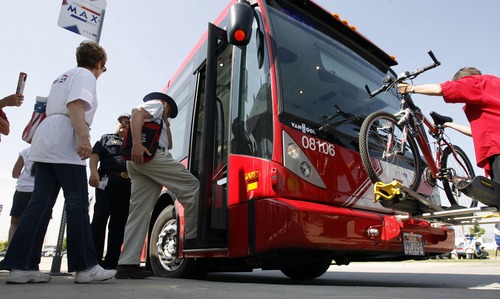This is an archived article that was published on sltrib.com in 2014, and information in the article may be outdated. It is provided only for personal research purposes and may not be reprinted.
Clearly, the Utah Transit Authority needs to turn a corner.
The agency has a major haul ahead of it, catching up with the need for more services for a rapidly growing population. To do that, it will need not only more money from taxpayers but also more support from riders, cities, large employers and members of the Utah Legislature.
Some news out of the transit agency over the past few days may help it on that score.
Despite its rapid build-out of the popular TRAX light rail system and the not-quite-so-popular FrontRunner commuter rail, UTA suffers from a reputation problem.
Its prices are high and its hours of operation are inadequate for people who work nights and weekends. Bus routes that serve hotel maids and auto mechanics were curtailed to fund rail lines that cater to bankers and entrepreneurs.
In recent days, members of the UTA board took the first step toward elevating H. David Burton to be their chairman. Universally known as Bishop Burton for his many years as the official of the Church of Jesus Christ of Latter-day Saints who was in charge of building energy-efficient temples and the successful City Creek shopping project in downtown Salt Lake City, Burton has a long record of getting things done.
That reputation, plus the fact he is a relative newcomer to UTA, should provide a relatively clean slate on which the agency can chart its future.
The downside of the choice, though, is that Burton's distinguished career was built inside a private — if not downright insular — organization, where public oversight was limited by design. That won't fly at UTA.
The other bit of good news is that agency officials have pledged to take to heart the many criticisms of a recent legislative audit. Most visible is the recommendation that the bonuses awarded to UTA executives — on top of salaries that have been way out of kilter for Utah's public sector managers — need to be reduced.
Though officials are still tight-lipped about the details of their plans, word is that executive performance bonuses will drop from as much as $30,000 to $7,500. Though that cap may prove to be far too porous, the move might help UTA regain some of the public trust it needs if it is to do its job.
Even people who fully support the need for a robust public transit agency have found that committing additional support — particularly increases in the transit sales taxes levied throughout UTA's service area — has been a hard sell.
It is time for UTA to stop being its own worst enemy and build the public trust it needs to succeed.



